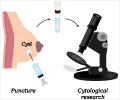A collaborative study involving two American institutions has led to the identification of a protein that is likely responsible for causing breast cancer to spread.
Scientists at Albert Einstein College of Medicine of Yeshiva University and their colleagues at Massachusetts Institute of Technology point out that metastatic cancer occurs when cancer cells from the original tumour travel to distant sites via the blood system, and that most deaths mainly occur due to it.They say that trying to stop that is the main goal of cancer treatments, but early markers of metastatic breast cancer have been hard to find thus far.
The researchers insist that their team have of late identified a protein that appears to be a promising candidate for a metastatic breast cancer marker, called Menainv.
According to them, this protein is present in invasive cells within a breast tumour, which move into surrounding tissue and eventually to blood vessels. The team say that Menainv is not on breast tumour cells that stay put.
Dr. John S. Condeelis, Einstein professor and one of the lead researchers, claimed that his team's study was the first to show that a protein contributes to the invasive and metastatic ability of tumour cells, rather than just being an ''innocent bystander'' that shows up when cells are invading, strengthening the potential use of this protein as a marker.
''We have micro-needles filled with growth factors and tissue that we insert into a tumour on an anesthetized mouse. If a cell is invasive, within four hours, it will crawl into the needles. We found that mouse breast tumour cells that we engineered to contain Menainv were invasive whereas cells that did not have Menainv were not,'' said Evanthia T. Roussos, an M.D.-Ph.D. student in Dr. Condeelis' lab and primary co-author of the study.
Advertisement
The researchers are of the opinion that medicines that inhibit EGF may lack effectiveness on tumour cells that express Menainv, as Menainvcells are so sensitive to EGF that even the small amount of EGF signal that the drugs fail to block might be enough to stimulate EGF receptor and promote tumour cell migration and metastasis.
Advertisement
The team say that such an antibody or PCR assay could be used to diagnose the presence of Menainv in biopsies and blood samples, allowing doctors to identify breast cancer patients who are more likely to have progressive disease and recommend the appropriate treatment.
Source-ANI
PRI














